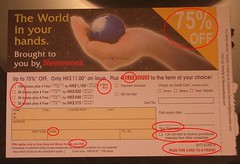Newsweek: an example in subscription cards
It’s very different from the institutional advertising that many large companies do: that one is not traceable in its results. And John Wanamaker famous say "I know that half of my advertising is wasted—I just don't know which half.” applies perfectly to institutional advertising…
Today we analyze an excellent example of mail-order advertisement: the subscription card to Newsweek (that I got on the
- “75% OFF” big in capital letters to catch attention right away. The use of capital letters has to be very judicious: not only Hopkins, but also David Ogilvy, in his excellent book “Ogilvy on Advertising” are very clear in saying that capital letters are good to attract attention but very bad in keeping it: a sentence written in capital is difficult to read as our eyes are not trained.
- “*75% OFF”: again the little *… but at least this time it’s clear the explanation: this is true for the 108 issues offer
- 108 Issues then 80, 54, 30: why not stating the subscription choices in the opposite order? Is this order random? No at all: it uses a principle called “Anchoring”: the first figure that is mentioned in a given situation will “anchor” our mind to it. Then another powerful psychological effect “The contrast Effect” kicks in: once we see the cost of the 108 issue choice, all the others will seem much cheaper in comparison. So, purchasing the 80-issue solution will not look too unreasonable: actually it will “feel” very reasonable, as our mind in anchored to the cost of the 108-issues, which is higher. If the card used the opposite order (30, 54, 80, 108) almost nobody would purchase the 108 and the 80-issue option
- “Best buy”: as marketing master Jay Abraham says “People are silently begging to be led”: as Jim McCann of 1800 Flowers was doing in yesterday’s posting, here Newsweek is leading us with good information: the 108-issue truly is the “Best Buy” and it makes sense to let the reader know it (and it increases the chance of people choosing that option…)
- 4 FREE ISSUES: again, very judicious use of the capital letters and the word Free.
- e-mail: Newsweek is taking the pain to collect emails: this is a very smart move, as email allows for free communication in a fast and very intimate way with the customer base
- “Offer expires in July 2005”: you are now champions of the Scarcity principle: just putting a time limit on an offer it increases the chances of getting readers to action
- “Your signature”: this is a very subtle one. Most probably that signature has no legal power, no legally binding commitment is made by signing. But, as dr. Cialdini explains in his excellent interview (click here), commitment/consistency is very strong principle of behavior in our society. So, having signed a card creates a public, voluntary and visible act of choice, that will increase the chances of us complying with it (ehhmmm, paying the invoice…) in the future
- “I do not wish to receive promotional material from other companies”: by default, it is unchecked. So, Newsweek is silently getting, by inaction of the reader, the permission to sell the name to other companies. Which, in many cases, it is a business more lucrative that selling their main product… this little box might very well be the most important box in the entire card
- “Pass this card to a friend”: Referrals – the source of free advertising at no cost, no risk
- “HT IC260-N”: a code! I love it! They will know exactly which issue of which magazine I found that card in, and they will be able to understand which magazines work best
Whoa, today it was a long article, but I am confident you found at least one interesting idea in it.
Now I got to go and post my Newsweek card: I should probably get the 108-issue and pass the card also to a friend
K in


0 Comments:
Post a Comment
<< Home